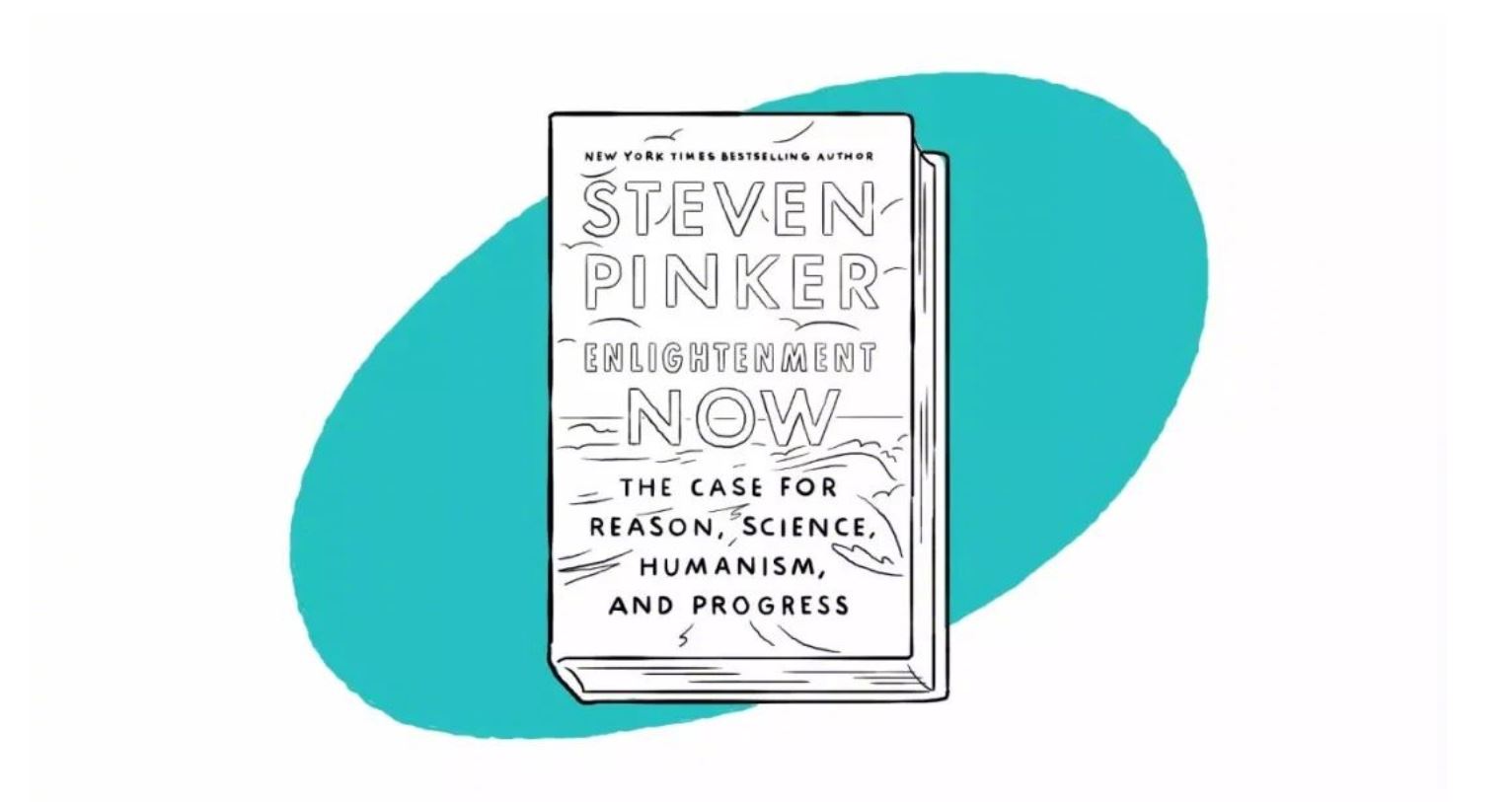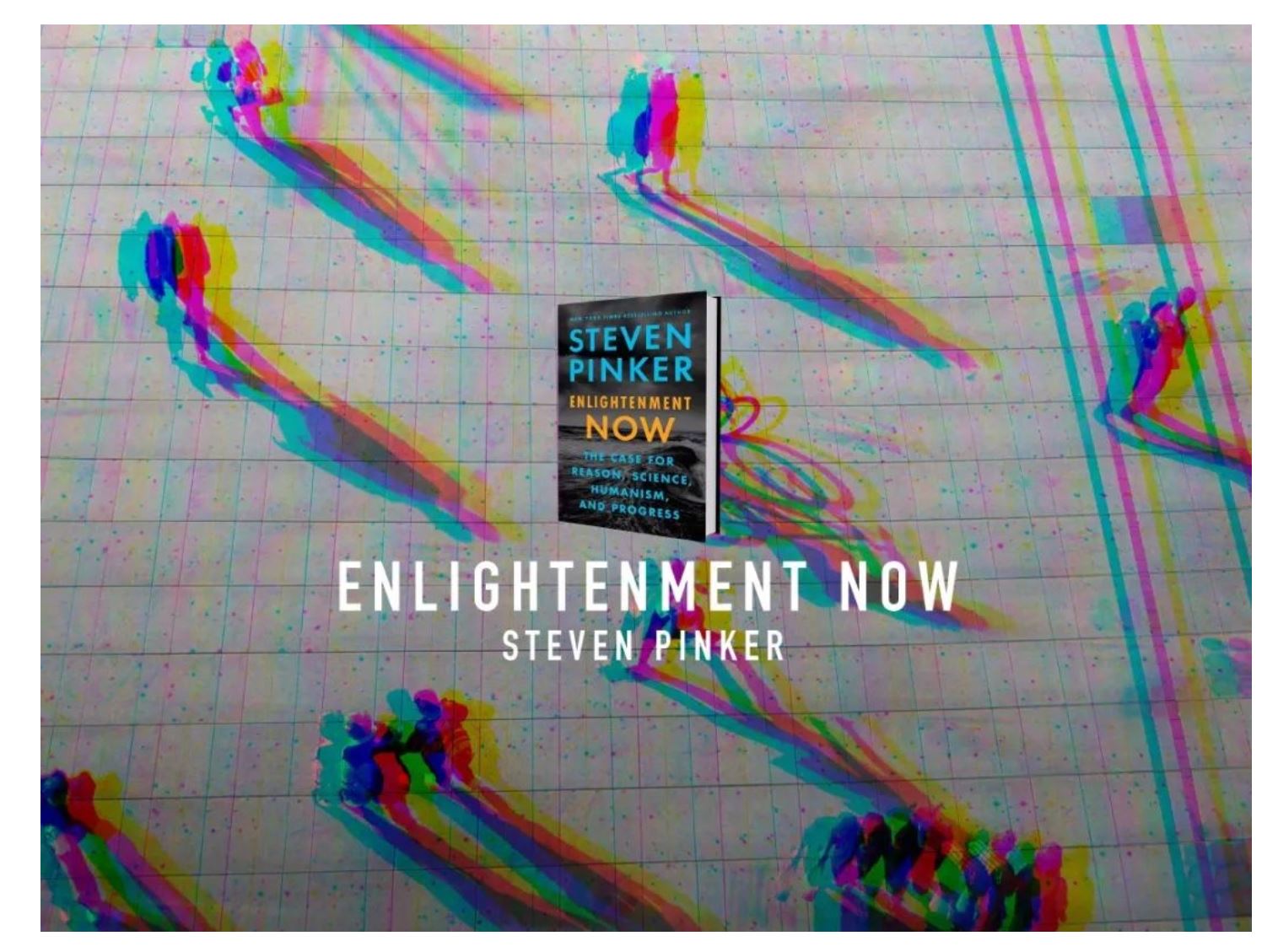本文转载自微博:比尔盖茨
Pinker)的《人性中的善良天使》(The Better Angels of Our Nature)是我十年来读过最好的书。如果我只能向人推荐一本书,那就是它了。平克用一丝不苟的调研证明,如今我们生活在人类历史上最和平的年代。我之前从未读到谁对进步做过如此清晰的阐释。
但我将不再老说这本书的好话了,因为平克已经超越了自己——他的新书《当下的启蒙》(Enlightenment Now,中文名暂译)比之前那本更棒。

《当下的启蒙》采用了他在《人性中的善良天使》使用的方法,追踪了历史上的暴力行为,并以暴力作为尺度衡量15个不同领域的进步(如生活质量、知识和安全)。这样做的结果是以一幅完整的图景呈现出世界如何及为何正在变好。这本书就像是加强版的《人性中的善良天使》。
虽然《当下的启蒙》要到二月底才会上市,但平克慷慨地给我寄了一本样书。我慢慢地阅读这本书,因为我太喜欢它了,但我想大多数人会觉得这本书读起来并不费力。平克设法用一种迷人、难忘且容易理解的方式成功地分享了大量信息。
它以一个支持回归启蒙运动理想的论点作为开篇——那是一个理性、科学和人文主义盛行的时代。
我完全赞成要有更多的理性、科学和人文主义,但我觉得最有意思的还是作者通过15章的内容,探讨每一个进步的衡量标准。平克尽自己最大的努力分析历史趋势,利用数据将历史放在一个大背景之下。我本来对他分享的很多信息已经非常熟悉了,尤其是健康和能源方面,但他对每个主题的理解都那么的深,以至于能用让人耳目一新的方式再次表达他的观点。
他愿意深入钻研原始数据源,然后从中提取出意想不到的进步迹象,我喜欢他的这种做法。我倾向于用像贫困和儿童死亡显著减少这样的事来证明进步,因为我认为它们能很好地衡量我们作为一个社会整体表现如何。平克写到了这些领域,但他同时还着眼于一些更为艰深的主题。

以下是这本书里我最喜欢的五个事实,从中你将知道世界正在如何变好:
1.如今你被闪电击毙的可能性要比世纪之交时小37倍。这并非由于雷暴变少了,而是因为我们有了更好的天气预测能力和更完善的安全教育,并且更多的人住在了城市里。
2.如今人们花在洗衣服上的时间从1920年的每周11.5小时减少到2014年的1.5小时。这在人类进步的宏伟计划里或许显得微不足道,但洗衣机的出现使得人们——尤其是女性——得以腾出时间来享受其他的追求,从而改善了自身的生活质量。这意味着每周都有近半天的时间可以用来做其他任何事,例如一口气看完《黑钱胜地》(Ozark)或阅读一本书,再比如开始一项新的事业。
3.你死于工作岗位的可能性大大降低。美国现在每年有5千人死于工作事故,但这一数字在1929年时高达2万,而当时我们的人口还不到如今的五分之二。那时的人们将致命的工作场所事故视为做生意所要付出代价中的一部分。如今,我们懂的多了,于是设计出了新的方法,使得我们在工作时不会将许多人的生命置于危险之中。
4.全球人口的智商平均数每十年提高3分左右。由于营养得到改善,生活环境变得更加清洁,孩子们的大脑发育得更加充分。平克还把这归功于课堂内外更多的分析性思维。想想看,每次查看手机屏幕或地铁地图时,你要理解多少符号。现如今的世界鼓励人从很小时就锻炼抽象思维能力,这使我们变得更加聪明。
5.战争是违法的。这似乎是摆明的事。但在1945年联合国成立以前,没有任何机构有权阻止国家间发动战争。虽然存在一些例外,但威胁实施国际制裁和干预已被证明是对国家间战争的有效威慑。
平克还研究了进步的事实与进步的感知这两者之间的脱节,这也是我花了很多时间思考的问题。全世界的人正活得更长寿、更健康和更快乐,可为什么还有那么多人认为事情正变得越来越糟?为什么我们会忽视那些积极正面的新闻故事,反倒对负面的新闻念念不忘?他很好地解释了我们会被悲观事物吸引的原因,以及这种本能如何影响我们感知世界的方式。不过,我希望他能更深入地从心理学角度进行探讨(尤其考虑到他是一名训练有素的心理学家)。已故的汉斯·罗斯林(Hans Rosling)在他杰出的新书《事实》(Factfulness,中文名暂译)中更全面地探讨了这一问题,我计划不久后给这本书写一篇书评。
我同意平克在大部分领域的看法,但我觉得他对人工智能还是有点太过乐观。他迅速否定了机器人会推翻人类创造者的观点。虽然我不认为我们会陷入《终结者》所描绘的危险境遇,但在恐惧之下的一个问题是:到底谁在控制机器人?这是一个值得思考的问题。我们还没到达那种程度,但在某一时刻,谁拥有人工智能和谁控制人工智能,将成为一个留给全世界处理的重要问题。
围绕自动化的这些重大问题可以证明,进步可以是一件杂乱而棘手的事,但这并不意味着我们前进的方向是错误的。在《当下的启蒙》一书的最后,平克表示:“我们将永远不会拥有一个完美的世界,而且寻求一个完美世界的做法是危险的。但如果我们继续将知识应用在使人类发展更加繁荣的事业上,我们所能获得的进步就会永无止境。”
这个世界正变得越来越好,尽管人们并不总是感受到这一点。很高兴我们能有像斯蒂芬·平克这样的杰出思想家帮助我们看清大局。《当下的启蒙》不仅是平克写过的最好的书,而且是我读过的所有书中最喜欢的一本。

My new favorite book of all time
For years, I’ve been saying Steven Pinker’s The Better Angels of Our Nature was the best book I’d read in a decade. If I could recommend just one book for anyone to pick up, that was it. Pinker uses meticulous research to argue that we are living in the most peaceful time in human history. I’d never seen such a clear explanation of progress.
I’m going to stop talking up Better Angels so much, because Pinker has managed to top himself. His new book, Enlightenment Now, is even better.
Enlightenment Now takes the approach he uses in Better Angels to track violence throughout history and applies it to 15 different measures of progress (like quality of life, knowledge, and safety). The result is a holistic picture of how and why the world is getting better. It’s like Better Angels on steroids.
Pinker was generous enough to send me an early copy, even though Enlightenment Now won’t be released until the end of February. I read the book slowly since I loved it so much, but I think most people will find it a quick and accessible read. He manages to share a ton of information in a way that’s compelling, memorable, and easy to digest.
It opens with an argument in favor of returning to the ideals of the Enlightenment—an era when reason, science, and humanism reigned supreme.
I’m all for more reason, science, and humanism, but what I found most interesting were the 15 chapters exploring each measure of progress. Pinker is at his best when he analyzes historic trends and uses data to put the past into context. I was already familiar with a lot of the information he shares—especially about health and energy—but he understands each subject so deeply that he’s able to articulate his case in a way that feels fresh and new.
I love how he’s willing to dive deep into primary data sources and pull out unexpected signs of progress. I tend to point to things like dramatic reductions in poverty and childhood deaths, because I think they’re such a good measure of how we’re doing as a society. Pinker covers those areas, but he also looks at more obscure topics.
Here are five of my favorite facts from the book that show how the world is improving:
1.You're 37 times less likely to be killed by a bolt of lightning than you were a turn of the century—and that’s not because there are fewer thunderstorms today. It’s because we have better weather prediction capabilities, improved safety education, and more people living in cities.
2.Time spent doing laundry fell from 11.5 hours a week in 1920 to an hour and a half in 2014. This might sound trivial in the grand scheme of progress. But the rise of the washing machine has improved quality of life by freeing up time for people—mostly women—to enjoy other pursuits. That time represents nearly half a day every week that could be used for everything from binge-watching Ozark or reading a book to starting a new business.
3.You're way less likely to die on the job. Every year, 5,000 people die from occupational accidents in the U.S. But in 1929—when our population was less than two-fifths the size it is today—20,000 people died on the job. People back then viewed deadly workplace accidents as part of the cost of doing business. Today, we know better, and we’ve engineered ways to build things without putting nearly as many lives at risk.
4.The global average IQ score is rising by about 3IQ points every decade. Kids’ brains are developing more fully thanks to improved nutrition and a cleaner environment. Pinker also credits more analytical thinking in and out of the classroom. Think about how many symbols you interpret every time you check your phone’s home screen or look at a subway map. Our world today encourages abstract thought from a young age, and it’s making us smarter.
5.War is illegal. This idea seems obvious. But before the creation of the United Nations in 1945, no institution had the power to stop countries from going to war with each other. Although there have been some exceptions, the threat of international sanctions and intervention has proven to be an effective deterrent to wars between nations.
Pinker also tackles the disconnect between actual progress and the perception of progress—something I’ve spent a lot of time thinking about. People all over the world are living longer, healthier, and happier lives, so why do so many think things are getting worse? Why do we gloss over positive news stories and fixate on the negative ones? He does a good job explaining why we’re drawn to pessimism and how that instinct influences our approach to the world, although I wish he went more in depth about the psychology (especially since he’s a psychologist by training). The late Hans Rosling explains this more fully in his excellent new book Factfulness, which I plan to review soon.
I agree with Pinker on most areas, but I think he’s a bit too optimistic about artificial intelligence. He’s quick to dismiss the idea of robots overthrowing their human creators. While I don’t think we’re in danger of a Terminator-style scenario, the question underlying that fear—who exactly controls the robots?—is a valid one. We’re not there yet, but at some point, who has AI and who controls it will be an important issue for global institutions to address.
The big questions surrounding automation are proof that progress can be a messy, sticky thing—but that doesn’t mean we’re headed in the wrong direction. At the end of Enlightenment Now, Pinker argues that “we will never have a perfect world, and it would be dangerous to seek one. But there is no limit to the betterments we can attain if we continue to apply knowledge to enhance human flourishing."
The world is getting better, even if it doesn’t always feel that way. I’m glad we have brilliant thinkers like Steven Pinker to help us see the big picture. Enlightenment Now is not only the best book Pinker’s ever written. It’s my new favorite book of all time.
----------------------------------------------------------------
版权声明:本文信息来自网络转载、版权归原作者所有。
转载声明:请在转载时注明出处;如果您发现有任何侵犯您权益的情况,请立即和我们联系,我们会及时作相关处理。
|

